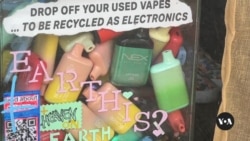ການເພີ່ມຂຶ້ນຢ່າງວ່ອງໄວຂອງການໃຊ້ຢາສູບໄຟຟ້າແບບໃຊ້ແລ້ວຖິ້ມ ຫຼື ທີ່ເອີ້ນວ່າເວັບ (Vape) ກຳລັງສ້າງຄື້ນມົນລະພິດຂະໜາດໃຫຍ່ ແລະ ສ້າງ ຄວາມກັງວົນດ້ານສິ່ງແວດລ້ອມຢ່າງຮ້າຍແຮງ. ທ່ານ ແອຣອນ ຣາເນັນ ລາຍງານຈາກນະຄອນນິວຢອກ ກ່ຽວກັບຜູ້ຍິງຄົນໜຶ່ງທີ່ກຳລັງພະຍາຍາມ ສ້າງຄວາມປ່ຽນແປງ, ເຊິ່ງ ພຸດທະສອນ ຈະນຳລາຍລະອຽດມາສະເໜີທ່ານໃນອັນດັບຕໍ່ໄປ.
ທີ່ນີ້ຢູ່ໃນເຂດ ບຣຸກລິນ ຂອງນະຄອນນິວຢອກ, ທ່ານນາງ ໂນຣາ ເຊິ່ງຂໍບໍ່ ໃຊ້ນາມສະກຸນຂອງລາວດ້ວຍເຫດຜົນດ້ານຄວາມເປັນສ່ວນຕົວ, ກຳລັງກວດ ເບິ່ງກ່ອງຖິ້ມຢາສູບໄຟຟ້າແບບໃຊ້ແລ້ວຖິ້ມກ່ອງໜຶ່ງ ຈາກຫຼາຍໆກ່ອງທີ່ລາວ ໄດ້ນຳໄປວາງໄວ້ຕາມຮ້ານຄ້າ, ຮ້ານຢາສູບ ແລະ ສະຖານທີ່ທ່ຽວກາງຄືນ.
ນາງ ໂນຣາ, ນັກເຄື່ອງໄຫວການໝູນໃຊ້ຢາສູບໄຟຟ້າ ກ່າວວ່າ
"ພວກເຮົາກຳລັງຈະໄປທີ່ Masion Jar ເຊິ່ງເປັນຮ້ານຕື່ມນ້ຳຢາຂອງຢາສູບ ໄຟຟ້າໃນເມືອງ ບຣຸກລິນ, ແລະ ເຮົາຈະໄປເບິ່ງກ່ອງລີໄຊເຄີນຢາສູບໄຟຟ້າ (ກ່ອງນຳໄປແປຮູບຄືນໃໝ່), ເຊິ່ງເປັນກ່ອງຮັບບໍລິຈາກທີ່ຄົນຖິ້ມຢາສູບ ໄຟຟ້າທີ່ໃຊ້ແລ້ວ ແລະ ພວກມັນຈະຖືກນຳໄປໝູນໃຊ້ເປັນອຸປະກອນ ອີເລັກໂທຣນິກ."
ທ່ານນາງ ໂນຣາ ກ່າວວ່າລາວເລີ່ມຄວາມພະຍາຍາມນີ້ໂດຍການລົງທຶນດ້ວຍ ຕົນເອງ ເພາະເຫັນຢາສູບໄຟຟ້າທີ່ຖືກໃຊ້ແລ້ວຖິ້ມຢູ່ຕາມຖະໜົນຫົນທາງພາຍ ໃນເມືອງ.
ທ່ານນາງ ໂນຣາ ກ່າວວ່າ
"ຂ້ອຍເຮັດຫຍັງກັບຢາສູບໄຟຟ້າເຫຼົ່ານີ້ຫວາ? ຂ້ອຍນຳພວກມັນໄປລີໄຊເຄີນ ເປັນອຸປະກອນອີເລັກໂທຣນິກ. ນະຄອນນິວຢອກ ມີສະຖານທີ່ເປີດຮັບໜຶ່ງມື້ ຕໍ່ອາທິດໃນທຸກເຂດ ເຊິ່ງຜູ້ຄົນສາມາດນຳອຸປະກອນອີເລັກໂທຣນິກຂອງຕົນ ໄປລີໄຊເຄີນໄດ້."
ຄວາມຄິດລິເລີ່ມຂອງທ່ານນາງ ໂນຣາ ເປັນຄວາມພະຍາຍາມລະດັບ ຮາກຖານເພື່ອຕໍ່ສູ້ກັບບັນຫາມົນລະພິດຈາກສາຢູບໄຟຟ້າທີ່ກຳລັງເຕີບໂຕ, ຢ່າງໃດກໍ່ຕາມ, ນັກເຄື່ອນໄຫວກ່າວວ່າຄວາມທ້າທາຍນັ້ນຍັງໃຫຍ່ຫຼວງຫຼາຍ.
ທ່ານລູຄັສ ກັດເຕີແມນ ເປັນຜູ້ອຳນວຍການໂຄງການທີ່ Public Interest Research Group ເຊິ່ງເປັນກຸ່ມສະໜັບສະໜຸນທີ່ໃຫ້ຄວາມສຳຄັນ ເລື່ອງສາທາລະນະສຸກ, ການຂົນສົ່ງ ແລະ ການສຶກສາລະດັບສັ້ນສູງ.
ທ່ານ ລູຄັສ ກັດເທີແມນ ກ່າວວ່າ
"ພວກເຮົາກຳລັງຖິ້ມສາຢູບໄຟຟ້າສີ່ອັນເຄິ່ງຕໍ່ວິນາທີໃນປະເທດນີ້. ບັນຫາ ຄືສາຢູບໄຟຟ້າເຫຼົ່ານີ້ເຮັດມາຈາກສ່ວນປະກອບທີ່ແຕກຕ່າງກັນ, ເຊິ່ງທັງໝົດ ຍາກຫຼາຍທີ່ຈະລີໄຊເຄີນ ຫຼື ຈັດການກັບມັນເມື່ອຖືກຖິ້ມແລ້ວ."
ອຸປະກອນເຫຼົ່ານີ້ຫຼາຍຊິ້ນສ່ວນມີວັດສະດຸທີ່ເປັນອັນຕະລາຍ ເຊັ່ນ ແບັດເຕີລີ (ຫມໍ້ໄຟ) ລິທຽມ ແລະ ສານນິໂຄທີນ, ເຊິ່ງອາດກໍ່ໃຫ້ເກີດອັນຕະລາຍຕໍ່ສິ່ງ ແວດລ້ອມຢ່າງຫຼວງຫຼາຍ. ສາດສະດາຈານຈາກມະຫາວິທະຍາໄລຄາລິຟໍເນຍ ແຊນ ແຟຣນຊິສໂກ, ເຊິ່ງໄດ້ສຶກສາບັນຫານີ້ຢ່າງເລິກເຊິ່ງ, ອະທິບາຍເຖິງ ອັນຕະລາຍເຫຼົ່ານີ້.
ທ່ານ ເຈຣາໄມອາ ມ໋ອກ ເປັນສາດສະດາຈານຈາກມະຫາວິທະຍາໄລ ຄາລິຟໍເນຍ ແຊນ ແຟຣນຊິສໂກ.
ທ່ານ ເຈເຣໄມອາ ມັອກ ກ່າວວ່າ
"ສານນິໂຄທີນໂດຍພື້ນຖານແລ້ວເປັນສານພິດຕໍ່ລະບົບປະສາດ. ນັ້ນໝາຍ ຄວາມວ່າມັນເປັນພິດຕໍ່ລະບົບປະສາດ, ລວມເຖິງສະໝອງ ແລະ ເສັ້ນປະ ສາດທັງໝົດໃນຮ່າງກາຍຂອງເຮົາ. ເມື່ອເຈົ້າມີອຸປະກອນແບບນີ້ທີ່ຖືກໂຍນ ຖິ້ມລົງພື້ນ ແລະ ເມື່ອມີຝົນຕົກ, ຜົນທີ່ຕາມມາແມ່ນນ້ຳຢາໄຟຟ້າທີ່ມີສານ ນິໂຄທີນ ແລະ ສານເຄມີອື່ນໆ ຈະຮົ່ວອອກລົງສູ່ນ້ຳ ແລະ ເລີ່ມປົນເປື້ອນ ກັບສິ່ງແວດລ້ອມໂດຍຮອບ."
ແນວໃດກໍຕາມ ສະມາຄົມຮ້ານຄ້າຂາຍຍ່ອຍຢາສູບໄຟຟ້າຊັ້ນນຳ ໄດ້ເລີ່ມຮັບ ເອົາ ແນວທາງການຮຽກຮ້ອງໃຫ້ມີການຫ້າມນຳເຂົ້າຜະລິດຕະພັນແບບ ໃຊ້ຄັ້ງດຽວແລ້ວຖິ້ມເຫຼົ່ານີ້ເມື່ອໄວໆມານີ້.
ທ່ານນາງ ເອພຣິວ ມາຍເອີ ເປັນຜູ້ອຳນວຍການຂອງສະມາຄົມການຄ້າທາງເລືອກປອດຄວັນ ຫຼື Smoke Free Alternatives Trade Association.
ທ່ານນາງ ເອພຣິວ ກ່າວວ່າ
"SFATA ມີສະມາຊິກຫຼາຍຮ້ອຍຄົນທີ່ເປັນຮ້ານຂາຍຍ່ອຍ, ຜູ້ຜະລິດໃນ ທຸລະກິດຢາສູບໄຟຟ້າ. ພວກເຮົາໄດ້ສຳຫຼວດຄວາມຄິດເຫັນຂອງພວກເຂົາ ເມື່ອໄວໆນີ້ ແລະ ມີຈຸດຢືນຕໍ່ຕ້ານຢາສູບໄຟຟ້າແບບໃຊ້ແລ້ວຖິ້ມ ເນື່ອງຈາກ ຜົນກະທົບຕໍ່ສິ່ງແວດລ້ອມ. ພວກເຮົາເຊື່ອວ່າພວກມັນສົ່ງຜົນເສຍຕໍ່ສິ່ງ ແວດລ້ອມ."
ທ່ານນາງ ມາຍເຍີ ກ່າວວ່າສະມາຊິກຂອງລາວຍັງສືບຕໍ່ຂາຍຜະລິດຕະພັນ ເຫຼົ່ານີ້ ເນື່ອງຈາກຄວາມຈຳເປັນທາງທຸລະກິດ.
ທ່ານນາງ ເອພຣິວ ມາຍເອີ ກ່າວວ່າ
"ໜ້າເສຍດາຍທີ່ສະມາຊິກຫຼາຍຄົນຖືກບັງຄັບໃຫ້ຕ້ອງຢູ່ລອດ, ດັ່ງນັ້ນພວກ ເຂົາຈຶ່ງບໍ່ຢາກຂາຍ. ແຕ່ແມ່ນ, ພວກເຂົາຂາຍມັນ, ເພາະຖ້າບໍ່ຂາຍ, ພວກເຂົາກໍ່ຕ້ອງໄດ້ປິດທຸລະກິດ."
ຫຼາຍປະເທດ, ລວມເຖິງຈີນ, ອີຣ່ານ ແລະ ສະຫະຣາຊະອານາຈັກ ອັງກິດ, ກຳລັງກ້າວໄປສູ່ການຄວບຄຸມຜະລິດຕະພັນເຫຼົ່ານີ້ຢ່າງເຂັ້ມງວດ. ໃນຂະນະທີ່ ສະຫະລັດ ຍັງຄົງຊັກຊ້າໃນດ້ານການຄວບຄຸມ ແລະ ຄວາມພະຍາຍາມໃນ ການລີໄຊເຄີນ, ບຸກຄົນຢ່າງທ່ານນາງ ໂນຣາ ກຳລັງສ້າງການປູກຈິດສໍານຶກ, ປູທາງສຳລັບການດຳເນີນການທີ່ເຂັ້ມແຂງຂຶ້ນ ເພື່ອຄວບຄຸມອຸປະກອນເຫຼົ່ານີ້ ໃນອະນາຄົດ.
ອ່ານລາຍງານນີ້ເປັນພາສາອັງກິດ
The rapid rise in disposable electronic cigarette, or vape, usage is creating a tidal wave of pollution, and it’s raising serious environmental concerns.
Here in the New York City borough of Brooklyn, Nora, who asked us not to use her last name for privacy reasons, is checking in on one of many vape disposable boxes that she has placed in stores, smoke shops and nightclubs.
“We are going to Masion Jar, which is a refillery store in Brooklyn, and we are going to visit a vape recycling box, which is a drop-off box where people drop their used vapes, and they will be recycled as electronics.”
Nora says she began these self-funded efforts because of all the discarded vapes she saw on the city streets.
“What I do with the vapes? I take them to recycling for electronics. New York City has locations open one day a week in every borough where people can take their electronics.”
Nora’s initiative is a grassroots effort to combat the growing problem of vape pollution. However, the challenges are vast, as activists say.
“We’re throwing out four and a half vapes per second in this country. The problem is that these vapes are made of different components, all of which are really hard to recycle or to deal with once they’ve been thrown out.”
Many of these devices contain hazardous materials like lithium batteries and nicotine, which can cause significant environmental harm. A University of California San Francisco professor, who has studied this issue extensively, explains the dangers.
“Nicotine is fundamentally a neurotoxin. What that means is that it's toxic to neurological systems, including our brain and all of the nerves in our bodies. When you have these kinds of devices that are tossed on the ground, and then there are rain events, the result is that the e-liquid with the nicotine and the other chemicals leaches out into water and starts to pollute the surrounding environment.”
Even the leading association of vape retailers has recently adopted a platform calling for banning the import of these single-use products.
“So, SFATA has several hundred members that are retailers, manufacturers in the vapor space. We recently polled them and took the position against disposable vapes for their impact on the environment. We believe that they are bad for the environment”.
Meyers claims her members are still selling these products out of business necessity.
“Unfortunately, many of the members have been forced to remain viable, so they would prefer not to. But yes, they do sell them, because if they don't, they will go out of business.”
Several countries, including China, Iran and the United Kingdom, are moving toward strict regulation of these products. While the U.S. still lags behind in regulation and recycling efforts, individuals like Nora are raising awareness, paving the way for stronger action to curb these devices in the future.







ຟໍຣັມສະແດງຄວາມຄິດເຫັນ